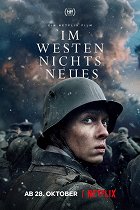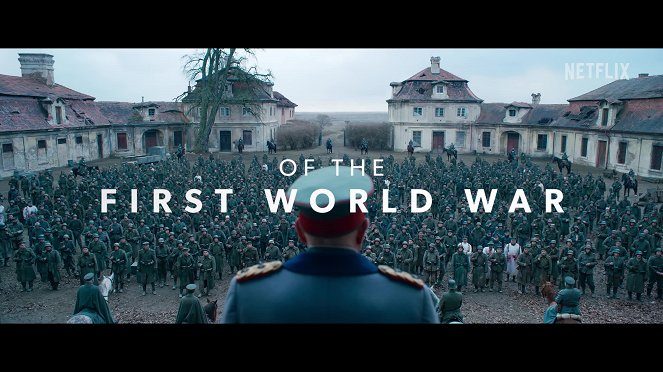Regie:
Edward BergerKamera:
James FriendMusik:
Volker BertelmannBesetzung:
Felix Kammerer, Albrecht Schuch, Moritz Klaus, Aaron Hilmer, Adrian Grünewald, Edin Hasanović, Daniel Brühl, Devid Striesow, Sebastian Hülk (mehr)Streaming (1)
Inhalte(1)
Der 17-jährige Paul zieht 1917 voller Euphorie an die Westfront, wo ihn schnell die grausame Realität des Krieges einholt. (Netflix)
Kritiken (11)
Die literarische Vorlage habe ich nicht gelesen, ich bewerte dieses Werk also nur als einen Kriegsfilm. Aus technischer Sicht ist er prima. An der Ausstattung, den Kostümen, der Kamera sowie der Gestaltung der Kriegs- oder Verhandlungsszenen habe ich nichts zu bemängeln. Die detaillierte Darstellung der Figuren und vor allem die Dialoge sind nicht so gut, sie wirken platt und die Emotionen sind nicht fesselnd. Das Drehbuch hätte sich mehr auf die persönlichen Geschichten von den Protagonisten und von einigen anderen Figuren konzentrieren sollen.
()
Ein sich wiederholender Wechsel zwischen der Kriegshitze und der Kälte des Wartens, rückkehrende Motive für begriffsstutzige Dummköpfe. Die wirkungsvollen Szenen aus der Buchvorlage wurden in dem Film durch einen einfachen (und manchmal unrealistischen) Kriegsporno und eine überflüssige politische Linie ersetzt, die völlig hohl ist. Der Film ist nicht in der Lage, Remarques eindringlichem Humanismus anders als durch das wortwörtliche Illustrieren des Konflikts der kleinen und der großen Geschichte nahezukommen, das nicht viel Sinn ergibt (die Schrecken des Großen Krieges hat wirklich nicht das Nachdenken der Deutschen verursacht, als Foch den Waffenstillstand erst in 6 Tagen wollte). Als Adaption ist Im Westen nichts Neues katastrophal, ohne Psychologie, ohne profilierte Figuren; als Film ist dieses Werk weitschweifig und durchschaubar. Die Versionen aus den Jahren 1930 und 1979 sind viel besser. Als eigenständiges Werk hat der Film aber auch versagt. Das Problem von Netflix ist nicht das Besetzen von farbigen Schauspieler*innen, sondern die Tatsache, dass seine Projekte ohne Hand und Fuß keine Dramaturgie haben.
()
An adaptation that isn't afraid to mess with the very foundations of what is rightly a timeless classic and yet it is the most faithful adaptation possible. An established benchmark of how to adapt the written word into film language (not telling and showing), preserving the message and yet "standing up and not being a mere illustration". Everything is subordinated to the suggestive concept of "you are there with them". The absurdity and futility of the war machine through everyday trench existential horror, which, however, in addition to the horrific scenes (through a war scene, through the simple survival without hope for the future), manages to contrast the humanity and unexpected permeations of normality in spite of everything (officers, timelessness, humanity), often without words; purely by sight, sound, suggestion, music. Yes, you could say that it doesn't build up, it just kind of flows during the last days on the front. That’s not very viewer friendly, but it’s the intention, and it works, without being the same over and over again. It cannot be denied that many of the horrors have already been handled equally impressively by other works (but it is hard to accuse the adaptation of the classic on which everyone is based of being "a bit dated"). This is a film that will inevitably divide, some will berate it because "they messed with my beloved book", others because "we've seen this before and we don't need to do it again", others will bemoan "the non-existent pace". And then there'll be those who won't sleep easy as a result, not because of the explicit depictions of wartime atrocities or the topicality "it was a century ago", but for the overall sense of the confusion of it all, even though it makes do with little; perhaps the mere pilgrimage of a uniform from the front.
()
Clear winner of this year's war films, and for me better than 1917 and Dunkirk (Hacksaw Ridge is a little higher in my heart though). I haven't read the book, nor have I seen the original, I just know that it's an adaptation of a literary classic by Remarque and I think the film stood up to it on all counts. From the very beginning the film thrusts us into the action of the war itself, which I very much appreciate – thankfully there is no hour-long introduction to the characters before the war, everything happens on the fly and thanks to that the film also has a decent pace and never gets boring. Edward Berger has his craft down pat, technically it's a decent work, with epic music that adds to the atmosphere and tension. The characters didn't really grow on me, except for the main one, so emotionally it didn't hit me that much, although it is sad in places. I found it interesting to watch a war film from the perspective of the Germans, usually it's the other way around, so the film is definitely unusual in that way too. I enjoyed the scenes with the General screaming for himself (the final speech was great) and the armistice negotiations on the train were also interesting. There's not a lot of action scenes, though, there are only three epic battles, but since the film is set in a battlefield most of the time, I didn't mind. The highlight is the sequence in the middle where the tanks and flamethrowers come on the scene – you can feel the true despair and horror of war, really uncomfortable. As for the gore, there's not much of it either, but there are a couple of brutal shots (the tank running over probably sticks in the mind the most), so for me really big satisfaction and I would say it’s the best WW1 war film. Definitely an Oscar snatcher here and kudos to Netflix. 8.5/10.
()
Erich Maria Remarque is one of my most beloved authors, one I come back to repeatedly throughout my life, and I have long postponed reading the first German adaptation of his most famous novel and the one most required in school curricula. There were many rumors about an inaccurate or even arrogant revision, so I am now shocked by how good the adaptation is. Not necessarily as the adaptation of a work, but rather as the comprehensive work of the filmmaker. It is precisely in the much criticized storyline of the negotiations over the end of the war that a few words or sentences are used to express the eternal pain that also appeared in books taking place long after the conflict or between the world wars. The minds and thoughts of the heroes mostly only harbor complaints about the unnecessary prolongation of the armistice, which results in the deaths of many innocents. For greater effect, such subjectivity is replaced with infuriating images and feelings of injustice. In the front lines, it is not about which scenes from the book were successfully transferred to the film (although the famous unbearable waiting in the trench with the enemy does not go lacking), but about the atmosphere of damnation, despair, and eternal damage that permeates every minute. I'm ultimately giving this the highest rating despite the omission of the storyline that troubled me the most in the book. In it, the main character returns home for a few days while on leave and realizes that the kind of return he imagined will probably never be possible. That people who have not experienced the battles will never understand the trauma and horror that a veteran carries. Within the condensation of the plot and the insistence on the destructive environment of contact with the enemy, I understand such a change and am happy to look past it. Because the literary work was created almost a hundred years before this film, and the warnings are no less relevant.
()
In the trailer, the All Quite on the Western Front teases us with visual exhibitionism, and you can't help but expect a proper war spectacle. Unfortunately, the opposite is true. For the entire 150 minutes or so, the filmmakers draw primarily on the formal identity of Saving Private Ryan, but miss the best moments entirely. Anyone who has seen Spielberg's opus remembers the names of the main characters: good guy Captain Miller, tough guy Captain Caparza, Ryan of course, not to mention iconic scenes like Normandy or the battle in the city; plus, with a hard-to-beat level of shocking authenticity and Kaminski's mastery of cinematography. Here, 10 minutes after the screening, you don't remember a single name and perhaps only one memorable scene – the one with the general in the puddle. Iconic, innovative and precisely crafted cult-classic vs. generic German filmmakers' wartime turmoil that is more akin to Hacksaw Ridge or We Were Soldiers. I deliberately mention Gibson’s films, because the level and depiction of violence is quite similar here. It might grab you by the balls for a second, but you’ll easily forget about it in a couple of minutes. It's still a solid film for Germans standards, with some spectacular and polished visuals in places, but it's not going to become a classic by any stretch of the imagination. For that, the story is blandly executed, the actors are lackluster and the action is too monotonous.
()
I’ve read the book once in high school and don't remember much of it, I'm not burdened by the demands of faithful adaptation. What I demand of a historical war film, however, is that it somehow expresses its thesis in a meaningful way, which All Quite on the Western Front (and Boredom and Ash) fails to do. There is no character development, no profiling in the opening and no emotion in the scenes where we are supposed to sympathise with the protagonists. The whole thing is mired in the bias of war scenes, of which only the transporter sequence leaves a bigger impression, otherwise every scene from the trenches has the same aesthetic: stick the camera on the protagonist and let it bang around. This is supposed to increase the suggestiveness and perhaps the subjectivity of the experience, but the film soon disproves this by layering melodramatic clichés and haphazardly involving "big stories" from the peace negotiations – by that point, it's already mixing together Come and See (in a weak concoction of the hero's suffering), 1917 (steadicam in the trenches), Paths of Glory (a moral about the futility of human sacrifice and the irrational thinking of generals), and Dunkirk (the role of condensed time during the negotiations, cutting to the impending battle). Together, of course, it's a mess, which mostly looks nice, but the sheer disjointedness of the journey leads to inevitable boredom and tedium. When I checked the progress bar and found that I still had over 40 minutes to go, I almost wanted to turn the film off. Of course, it only takes the basic ideas and motivations from Remarque, I know that, even with the rather clouded memories of the book (and unfortunately that's the least of the problems).
()
Gleich zu Beginn muss ich sagen, wie schade es ist, dass der Film direkt auf Netflix und nicht in die Kinos kam: Zugegebenermaßen war es keine so eindringliche audiovisuelle Erfahrung wie im Fall von 1917 oder Dunkirk ... aber es gab dennoch viele Szenen, die auf der großen Leinwand großartig gewesen wären. Ich zögerte zunächst, den Film anzuschauen, war aber überrascht, als ich sah, dass er in neun Kategorien für den Academy Award nominiert war - also musste ich ihn mit eigenen Augen ansehen. Obwohl der Film Im Westen nichts Neues heißt, handelt es sich um eine eher lose Adaption, was mich persönlich jedoch nicht gestört hat: Das ursprüngliche Thema wurde vielleicht aus einer etwas anderen Perspektive betrachtet (mit einer Betonung des Kontrasts zwischen den "unbedeutenden" Soldaten in den durchnässten Schützengräben ohne Nahrung und den "großen" Männern im Warmen mit ausreichend Essen), aber die Grundgedanken der Schrecken und der Sinnlosigkeit des Krieges sowie der gestohlenen Jugend auf Kosten "höherer" Ziele sind im Film präsent. Ich lobe die Tatsache, dass der Film in den meisten Fällen eher auf unbekannte Gesichter setzt, obwohl ich im Fall der Hauptfigur die ganze Zeit Rupert Grint vor Augen hatte. Obwohl der Film fast zweieinhalb Stunden lang ist, hat er es geschafft, mich während der gesamten Laufzeit zu fesseln (der für meine Ohren dissonante Soundtrack war gewöhnungsbedürftig) - ob es nun die realistisch dargestellten und erschreckenden Aufnahmen von der Front waren (die Ankunft der Panzer, die Flammenwerfer und die Sequenzen aus dem gefluteten Loch werden mir noch lange im Gedächtnis bleiben), das freundschaftliche Plaudern oder der Diebstahl des Geflügels. Aber die neun Nominierungen scheinen mir übertrieben, auch wenn das Ergebnis (zumindest technisch) ein guter Film ist.
()
Wenn man Erich Maria Remarque hört, erinnere ich mich an meine kleine Umfrage, als ich noch am Gymnasium war. Ich habe alle Leute gefragt, die ich kannte, welcher Roman ihnen als erstes einfällt, wenn ich den Namen dieses deutschen Schriftstellers ausspreche. Ich erwartete, dass "Im Westen nichts Neues" in der Umfrage eindeutig gewinnen würde. Ich habe mich geirrt, weil ich mein Umfeld literarisch überschätzte – es hat keiner gewonnen… Persönlich mag ich von Remarque lieber andere Titel, mein Favorit wurde zwar auch schon auf die Leinwand gebracht, aber total verunstaltet. In Bezug auf die neueste Verfilmung von "Im Westen nichts Neues" bleibt nichts anderes übrig, als zu loben und den Deutschen zum erfolgreichen Umgang mit einem der bedeutendsten Antikriegsromane in der Geschichte zu gratulieren. Ich habe den Roman vor vielen Jahren gelesen, hatte aber die ganze Zeit das Gefühl, dass die literarische Vorlage nur eine freie Inspiration war. Zumindest bin ich davon überzeugt, wenn ich den Abschluss des Films betrachte, denn dann könnte es nicht "Der Weg zurück" geben. Ich bin mir auch sicher, dass das Buch nicht so explizit wie der Film war, aber das macht überhaupt nichts – es unterstreicht wenigstens die Unsinnigkeit und die Nutzlosigkeit des ganzen Krieges. Die Schauspielleistungen von Felix Kammerer und von meinem Favoriten Daniel Brühl in der Nebenrolle sind ausgezeichnet. Die Musik ist verdient oscarpreisgekrönt. Die Filmemacher könnten jetzt mit "Drei Kameraden" anfangen…
()
Yesterday, I saw the 1979 American rendition of this movie, and while it had its flaws, the creators stayed true to the book, albeit loosely at times. On the flip side, despite the correct title and character names, the new German version diverged significantly from Remarque's book. Unlike the American version, the German one painted a more realistic picture of the war—the trenches looked right, and it effectively portrayed the impersonal war machinery where soldiers were treated as mere expendables. However, the creators took the de-personalization to an extreme, resulting in flat characters (except for Paul and Katczinsky), making it difficult for me to connect with any of them. Even when they made an effort to make the battles realistic, there were lapses, like extras wandering around destroyed trenches after artillery bombardments. Fortunately, the French machine gunners were apparently on a smoke break. Putting the book aside (which is a challenge for me), it was a decently crafted film depicting the senselessness of warfare, showing the ludicrous pursuit of a two-hundred-meter strip of land, resembling the moon's surface, at the cost of hundreds of thousands of casualties on both sides. / Lesson learned: Running towards machine guns is not a healthy sport.
()
In All Quiet on the Westen Front, there is only one shot - a long sequence with an imperceptible travelling forward - where the face of the actor Felix Kammerer (arguably the main character of the movie) appears in full screen, in its absolute and preserved peacefulness. The viewers understand he has just been passing, in the franco-german trenches, ironically by the exact time of enactment of the Armistice. Edward Berger seems to tell us: Death is beautiful. Yes it can be so after more than two hours of tragic absurd and dreadful description of events seen from the exclusive point of view of the (German) losers of the First World War, where no death is spared to the viewers. And where so many young men fell to their death or became orendously mutilated in the name and for the honour of their country and its political and military leaders. Such a unique waste may be alluded to by Edouard Berger in the first scene of the movie, filmed in a low angle, of a mother fox and her babies, warmly pressed against each other below earth in their burrow. Only human animals can find in themselves the will, strength and illusion of fighting till death for an abstract political concept such as that of territorial homeland. We are thus reminded of those so-called "primitive" societies that were shedding tears upon the birth of any new born child, in anticipation of the difficulties and challenges to come that she or he would have to face later on in life. And, as can be expected from said people, the members of these tribes were celebrating joyfully the passing of any of them, as a testimony of the end of earthly hardships for the deceased. And in between birth and death, according to what may be one of the meaning of this movie, there is only cynism. No place for any hope of redemption for any of its characters, all passively blown away by the craziness of war. At the end ,what remains is the impression of a too long and familiar scenario of the same senselessness . The quality of the photography by James Friend is to be highlighted.
()


